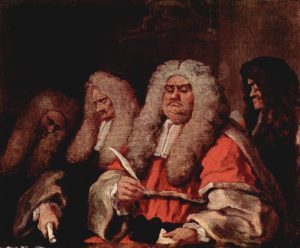Thoughts on Sunday’s Lessons for Oct. 20, 2019
First Reading (Track One): Jeremiah 31:27-34
A theme of patient persistence recurs in Sunday’s readings: Place your hope in God; and even in the face of challenges, be persistent.

The Bench (1758), oil painting on canvas by William Hogarth (1697-1764). Fitzwilliam Museum, Cambridge. (Click image to enlarge.)
In our Track One first reading, Jeremiah pauses in his nearly relentless lamentation over the sins that led Israel and Judah into exile, offering words of hope and the certainty of God’s love. Using a colorful metaphor about sour grapes, he makes clear that the people fully deserved hard times. But, the prophet foretells, God will forgive them, offer them a new covenant, and return them home, just their ancestors came out of slavery in Egypt.
First Reading (Track Two): Genesis 32:22-31
The theme of hope in God and persistence, even in the face of challenges, continues in Sunday’s Track Two first reading. In this strange narrative from Genesis, Jacob wrestles all night with an angel! Jacob, the grandson of Abraham, son of Isaac, and father to Joseph, is a key figure in the Hebrew Bible’s ancestral genealogy. Perhaps the lesson in this strange story is about persistence, as Jacob won’t surrender to this powerful stranger who injures his hip but can’t take him down: Stay the course, even when it’s hard, and you may earn God’s blessing.
Psalm (Track One): Psalm 119:97-104
The longest of all the Psalms, Psalm 119 devotes all of its 176 verses to a long, loving celebration of the Torah, the first five books of the Hebrew Bible. The ancients understood Torah as God’s “teaching,” but in English bibles it is usually translated as “Law,” a word that we may read with a different connotation. Think of love for God’s word and get a clearer sense of the people’s patient, persistent efforts to study and learn until God’s teachings are written on their hearts in words as sweet as honey.
Psalm (Track Two): Psalm 121
This ancient hymn is one of the traditional “songs of ascents” thought to have been chanted by worshippers as they processed toward the Temple in Jerusalem. Its assurance of God’s protection as we lift up our eyes to the hills, seeking from where our help is to come. makes it one of the most comforting psalms of hope and trust. Always awake, always watchful, God protects us by day and night, watching us come and go, keeping us safe today and forever.
Second Reading: 2 Timothy 3:14-4:5
Does this reading call us to be bible-thumpers, lecturing unbelievers and rebuking them if they won’t listen? Of course we don’t read it that way. This late New Testament document was written when the young church was fighting persecution. Rather than giving up, the writer advises the troubled flock, learn scripture and be persistent about proclaiming the kingdom of God. In good times and hard times alike, they are to “convince, rebuke, and encourage” in the name of Jesus, because proclaiming the kingdom was so important.
Gospel: Luke 18:1-8
In the patriarchal world of the ancient Near East, widows were helpless, vulnerable and weak. This widow in Jesus’s parable, though, is tough in spite of it all. She won’t quit pounding the corrupt and shiftless judge with her demands until he finally gives her the justice that she seeks. What does this mean for us? Jesus tells us at the beginning and the end of today’s Gospel: Pray always and do not lose heart. God will grant justice to the chosen ones who pray by day and night.
What are “Track 1” and “Track 2”?
During the long green season after Pentecost, there are two tracks (or strands) each week for Old Testament readings. Within each track, there is a Psalm chosen to accompany the particular lesson.
The Revised Common Lectionary allows us to make use of either of these tracks, but once a track has been selected, it should be followed through to the end of the Pentecost season, rather than jumping back and forth between the two strands.
For more information from LectionaryPage.net, click here.
